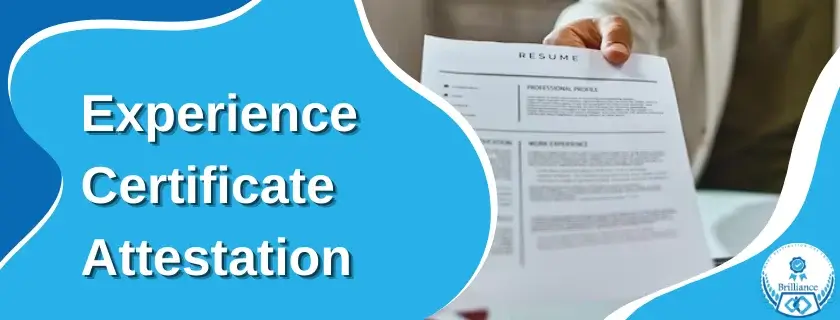Experience Certificate Attestation is an essential part of the process where the veracity of the pure and authentic information about a person's professional experience is tested. Some of its numerous functions are such as ensuring the period of employment, assessing professional skills, and adhering to legal regulations. Institutions or government agencies endorse with their experience certificates the credits of candidates on employers' or educational institution's behalf.
Obtaining a certificate of experience for many professionals who dream of employment opportunities in overseas countries is an inevitable step. This document acts as evidence of employment history which is used to reinforce visa applications and job applications often. However, problems may arise when foreigners have to deal with different countries' experience certificate attestation processes and requirements, too. Let us have an overview of the different procedures employed for the attestation of experience certificates in detail.
Method 1: Embassy Legalization
Embassy attestation is the other traditional method of experience certificate legalization. A job seeker has to perform this function by presenting an experience certificate to the relevant embassy of the country where they plan to work. The embassy then corresponds to the original document to make sure that all the requirements are met. Most of the time if you need consular legalization of documents they should be authenticated.
Method 2: Apostille
Apart from experience certificate attestation through affidavits, the apostille method is also widely used. The Apostille is a treaty that helps to draw the legal certification of documents across the signatory countries that are members of the Hague Convention. One advantage is that it allows the validation of documents without the need to require foreign authority to give additional legal certification. However, not all the countries are members of the Hague Convention, this is why the Apostille notion is not always relevant.
Method 3: MEA is the Ministry of External Affairs (MEA).
Most countries are guided by their foreign ministry called the Ministry of External Affairs (MEA) which could be accredited to attest procedures. Through this, I will be able to present the experience certificate to the MEA in a foreign country hence I will be able to get the necessary attestation. MEA is charged with verification and experience certificate attestation through its official stamp or seal. The Apostille system is the common method of authentication of official documents in countries that are not signatory to the Hague Convention but still require the authenticity of such documents.
Method 4: Notary Public
Notary publics are authorized persons who can certify and authenticate documents that have the seal. Legalization by meaning notary in some countries may be a substitute embassy legalization or MEA apostille. Through the process of a notarization, an individual may obtain an experience certificate attestation which offers a guarantee of the authenticity of their experience certificate. Notarization can serve as a convenient option whenever other formal methods like certification are not been given or are not practicable.
Several procedures and options are available for experience certificate attestation, which may have different procedures and requirements to follow. The legalization of embassy, Apostille, MEA attestation, and notarization are the most popular methods with the single exception that visa authorities may demand other procedures in some countries. The professionals must know these methods and select the approach that is most suitable for their particular situation.
Once the document has been certified at all relevant levels, experience certificate attestation becomes legal and therefore you will be able to use it abroad to apply for jobs and other educational programs. It is a must to obey the guidelines and procedures accepted by the organization responsible for the verification as a key factor for the verification process to be effective.





